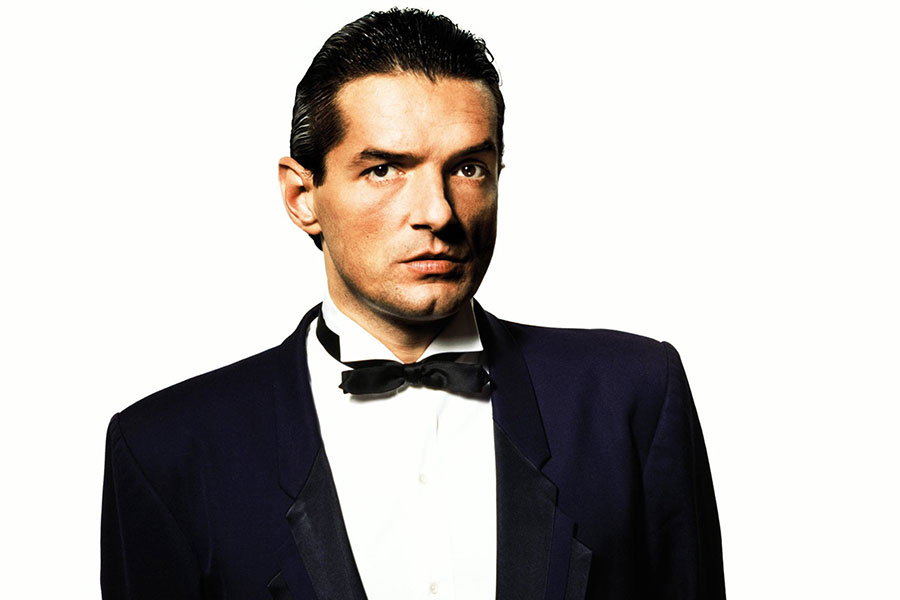Although pop singer Falco died more than two decades ago, his legacy lives on in today’s Austrian pop music scene. Bands like Wanda and Bilderbuch capture the late musician’s confident swagger, not to mention they serve up incredibly memorable tunes sung in a mix of the Austrian-German dialect. Many will know Falco for the worldwide hit “Rock Me Amadeus.” But who was Falco? This month, let’s explore the pop rock music of Austrian singer Falco and practice the German language.
Get to Know Falco
Falco was born Johann Hölzel on February 19, 1957, in Vienna, Austria. His mother was said to be pregnant with triplets but miscarried two of the children. Johann, or Hans as he was also known, was the one who survived.
Music became an integral part of his life from an early age. At an age when most children are learning to read, he received gifts like a child’s piano and a record player. By the time he was a teenager, he began attending the Vienna Conservatoire, a university instructing students in music and the arts. But his time at the university was shortlived. What followed was a brief apprenticeship in pension insurance as well as his mandatory military service.
But by the late 1970s, Johann was a regular, albeit not a celebrity, part of Vienna’s nightlife. Using pseudonyms, he joined several bands playing bass. In 1977, he joined the Hallucination Company, a sort of rock music collective. It was the following year, as a member of the group, that he first adopted the name Falco.
Soon after, he became a member of the shock rockers and provocateurs Drahdiwaberl. With this group, he came more fully into the persona he would become famous for. And it was with the group that he gained attention for his vocals on the song “Ganz Wien,” about the drug scene of the Austrian capital city. The song garnered the attention of music producer Markus Spiegel. He signed Falco to a music contract. And the rest, as they say, is history.
Music of Falco
From the very beginning, Falco’s unique style was at the forefront of his music. This is evidenced by “Der Kommissar,” the B-side of his first single in 1981. The track features verses delivered in a spoken rap-style. (English language audiences may know the translated version of the song by the British band After the Fire. The track won the group a top five hit on the Billboard Hot 100 in 1982.)
While counting “Ganz Wien” (including an English version of the track titled “That Scene”) and “Der Kommissar” amongst its tracks, Falco’s debut album Einzelhaft established his career in Europe.
In 1984, Falco released his sophomore album, Junge Roemer. With its driving funk influences and poppy rock sound, it was well-received. And not only in German-speaking countries. The title track reached the second spot on the Spanish singles charts and fifteenth in the Netherlands.
International Success
But it was Falco 3 that gave the boy from Vienna international success. The timing was right as the film Amadeus received glowing reviews and eight Academy Awards in 1985. In October of 1985, Falco released his third album, the aptly named Falco 3. The album included the memorable and infectious “Rock Me Amadeus.” Instantly recognizable, it was a truly international hit.
Riding the wave of success that “Rock Me Amadeus” earned him, two further singles (the upbeat “Vienna Calling” and the ballad “Jeanny”) received international attention.
By this time, Falco’s career was focused on Europe and, eventually, only in German-speaking countries. Four albums followed: 1986’s Emotional, 1988’s Wiener Blut, 1990’s Data de Groove, and 1992’s Nachtflug.
The Comeback
Sadly, in February of 1998, less than two weeks before his 41st birthday and while in the Dominican Republic working on what would be a comeback album, Falco died in an auto accident. But what a legacy he left behind. That includes that long-awaited comeback album that was posthumously released: 1998’s Out of the Dark (Into the Light).
Looking for another Ohrwurm to help you learn German? Check out previously featured musicians and bands!
Photo by Curt Themessl. This post contains affiliate links.

Pingback: German Music 2014 Recap - Reverberations